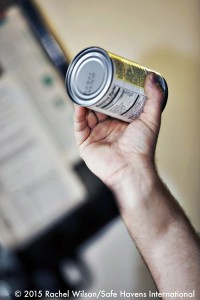
Some teachers and even students have been advised by at least one “options based” active shooter training program to keep canned goods to throw at a gunman during an attack. This advice is unsound, untested, dangerous and will likely be extremely difficult to defend in court. The danger that a student or staff member will attack an armed person who is not an active shooter and prompt a shooting or a suicide is very real and has been demonstrated through controlled simulations. There have also been numerous serious injuries to school staff during poorly implemented options based active shooter training sessions. Many school and law enforcement officials utilizing some of these programs are extremely exposed to civil liability.
ALICE Training Canned in Media and Social Media
Advising students and staff to keep canned goods on their desk to throw at a gunman is an inherently dangerous and illogical approach. This outcome is but one troubling symptom of a number of poor quality “options based” active shooter training approaches. After more than $300,000 worth of emergency room medical bills resulting from active shooter training were paid by one insurance carrier in Iowa, the Iowa Department of Homeland Security shut off their agencies’ funding for ALICE training. ALICE is one of a number of programs that teach close quarters combat concepts (CQC) to staff and in some instances to students. Make no mistake about it, no matter what instructors may say, any program that teaches people to physically attack a person with a gun is CQC training regardless of what you call it.
Options Based Active Shooter Training Injuries Verified
According to Jerry Loghry from ERM Insurance, these injuries were sustained during “options based active shooter” training sessions. It is important to note these figures do not count surgeries, physical therapy, disability claims or other follow up costs. Due to the many injuries that are being reported around the country, we anticipate considerable litigation against trainers, schools and law enforcement agencies who have been providing unsafe active shooter training programs. As an experienced school safety expert witness, I feel that many school and law enforcement agencies will experience significant challenges in demonstrating that they have followed appropriate standards of care in many of the current types of training programs. This is due to the way some of these training programs are structured, delivered and because they have been falsely advertised as proven to work.
Misleading Marketing Practices
Further complicating matters from legal and ethical standpoints are the sometimes wildly inaccurate descriptions of these training programs as a “best practice”. Being a new and popular concept is far different from being proven to be effective and accepted as the standard in a particular field. If you investigate definitions for best practice you will see that most definitions describe a best practice as a practice that has consistently shown superior results in contrast to other approaches. To make matters worse, trainees are also often falsely assured that “Good Samaritan” laws will protect them if something goes wrong. An attorney for the Indiana School Boards Association advised us that these laws often only apply to rendering emergency first aid and offer no protection for the use of force in self-defense in many states.
ALICE Training and Canned Goods
Quite a few people asked me what my opinion was about a school principal who sent a letter to parents urging them to have their children bring canned goods to school for self-defense. The letter states that local police suggested this practice and that students should throw canned goods at a gunman should an attack occur. Media reports attribute this advice to ALICE training sessions. If true, this is not the first time instance where schools have been advised to issue canned goods by options based active shooter instructors.
School Safety Expert View
I have now worked in this field for 34 years, have worked eight K12 active shooter events and have worked hundreds of other far more typical school shootings, stabbings and other school crisis events. Unlike most people in the field, I have actually been shot at while on campus and have survived an attack by an armed aggressor using close quarters combat techniques when I was not carrying a gun. In my opinion, telling staff and students to carry cans of canned goods to throw at a gunman is unsound and will clearly increase overall danger for a host of reasons. There are many other options available to us today and unlike arming teachers and kids with canned goods, they have actually been validated as safe and effective to implement.